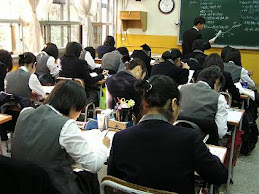- everyone thinks you're good at math
- your parents have either made you play the piano, the violin, or both
- you bring home all A's and one B, and your parents yell, "Why did you get a B?!"
- when some mega-mega nerd student is in the Korean newspaper, your parents say, "Why can't you be like him/her?!"
- you were in Junior High, you were a nerd
- you either have to be a doctor, lawyer, or some big-time business tycoon
- you bring home straight A's, and your parents say, "So? You're supposed to get that! When I was in Korea..."
- your parents have to know everything about your new friends: their name, where they live, their phone numbers, what kind of grades they get, what they got on their SATs, etc.
With only eight bullet points, I covered the main stereotypes of Koreans, but there are so many more. My main goal is to address the validity of these stereotypes and discuss the cultural consequences between the Korean and American education systems. I'm a Korean-American myself, but until I started researching this topics, I didn't realize there were so many discrepancies between these two education systems and cultures.
It's true: For several years now, Korean-American students have topped the charts for academic scores, but the sad part? They have also ranked at the top for suicide rates at universities and colleges. My initial reaction was, "If these students are among the top in the academic world, shouldn't they be happy?" Then I realized the importance of Korean culture and how much it affects these Korean-American students. Korean parents are doing whatever it takes to place their students in American schools, constantly pressuring them to achieve the "American dream". Not only do these demands overwhelm Korean-American students, but they also lose their identities while caught in the midst of two cultures. The traditional beliefs emphasized so strongly at Korean homes conflict with the creativity that American schools promote.
So now, the questions: How do these cultures conflict? Do students of other races develop biases against Korean-Americans? Is there hostility/jealousy among these other races against Korean-Americans for their achievements? Are Korean-Americans' obsessions with education seen in a negative light?
Feel free to contribute any thoughts on this, and I will keep posting with more research.
-Alice C.
